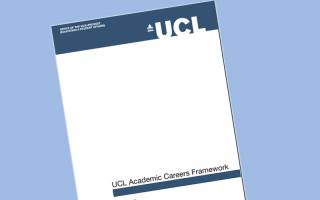Guidance on using the UCL Academic Careers Framework
UCL’s long-range strategy, UCL 2034, acknowledges that reward for staff, and recognition of their achievements, is key to the university’s wider ambitions for its research, education, innovation and enterprise activities.
In order to facilitate that recognition and reward, we have developed the Academic Careers Framework. For each of grades 7-10, the framework brings together typical activities, networks and impact indicators. It seeks to describe and codify the types of activity that may feature within an academic career, at an individual grade, and across grades over time.
These descriptions can be used as reference points for staff planning careers, to support appraisal discussions and by those preparing a case for promotion. The framework has been developed to be relevant to staff on academic or teaching and research fellow contracts.
The scope of activities and indicators of success listed under each grade are intended to be broad, reflecting the variety of work that can be undertaken by staff across a large, multidisciplinary university. They include criteria that will be appropriate for staff working in ‘lonescholar’ disciplines, as well for those in team science contexts. The descriptions are not exhaustive and no individual should expect to be able to meet all of the criteria itemised. In making decisions about which to apply, staff should have regard to the context of their discipline(s). Where evidence of national or intentional collaboration is suggested, staff should again have reference to discipline context. There is no assumption that an international collaboration is inherently more significant than one undertaken with national partners.
The framework is relevant to all staff on academic, research or teaching contracts.
For each grade, the threshold research and education statements articulate the pre-requisite qualities expected of all staff on academic contracts at that grade, and those seeking to make a case for promotion to that grade. Relevant threshold criteria also apply to staff on research and teaching contracts.
Core activities under both research and teaching will apply frequently to academic staff with a mixed portfolio – i.e. those who are engaged in research and teaching – as well as to research and teaching staff. All academic, research and teaching staff are expected to demonstrate at least some core activities under enterprise/external engagement and/or institutional citizenship.
Relevant specialist activities are likely to be demonstrated by research or teaching staff or where a member of staff on an academic contract is specialising in education or research. For example, as well as demonstrating threshold research and education qualities, specialist research might take the place of some core education attributes and vice-versa for specialist education. Equally, a member of staff on an academic contract might specialise in enterprise or external engagement, demonstrating specialist attributes in that pathway rather than some of the core or specialist research or education ones.
Given the varied nature of modern academic careers, some overlap between the criteria is likely, and staff should consider both core and specialist categories when using the framework, regardless of their contractual status.
As well as outlining types of threshold, core and specialist academic activity, the framework sets out the typical network and reach at each grade. It also sets out example indicators of impact.
For promotion cases more detail is provided in the relevant guidance notes but the key element of any case will be a demonstration of your own personal impact in the context of the framework as a whole.
 Close
Close


